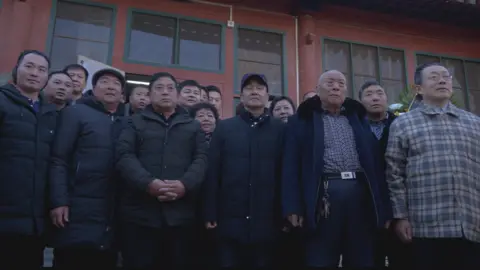Zhao Ziyang: A reformer China's Communist Party wants to forget
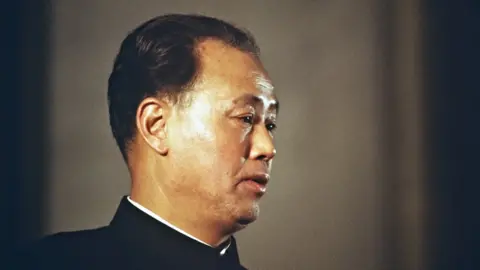 Getty Images
Getty ImagesIn a small, central Beijing courtyard, family and friends are gathering to pay tribute to Zhao Ziyang - the most powerful man in China to oppose the decision to send tanks into Tiananmen Square nearly 30 years ago.
He was subsequently erased from Chinese history for what party officials deemed his "serious mistakes" that day.
To reach his traditional courtyard home, mourners and journalists alike must run a gauntlet through a twisted alleyway, with groups of police and plain-clothed guards on every corner, waiting to interrogate and prevent would-be visitors.
Today, on a cold, January day, on the anniversary of Zhao's death from a stroke in 2005, numerous police vehicles flank every entrance. Parked outside the gate is an unmarked security car; the occupants monitoring arrivals and muttering into radios.
"What a miracle you all showed up here," Zhao's daughter, Wang Yannan, tells the small group of us who made it inside the courtyard.
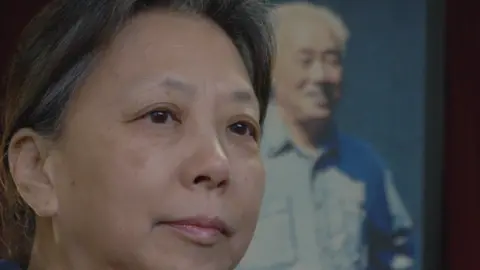
China's Communist Party has spent nearly 30 years trying to erase the events of 4 June 1989 from history and young people here have little knowledge or understanding of what happened that day. The story of Zhao Ziyang is proof those efforts still continue: the man who was the highest ranking Party official in the country at the time of those momentous events is now expunged from the record and, even in death, still regarded as a threat.
Every year, the family says, the number of people who come to pay their respects diminishes slightly. Some are stopped from entering when they arrive or - as Zhao Ziyang was for 16 years - prevented from travelling around the city.
"It's been like this for many years. What else can we do about it?" Zhao's son, Zhao Er'jun, is resigned to the hassle.
"Sometimes we go out and help people get in. This man used to be a secretary of my father's - he was dragged into a dispute with the police outside. Even he was nearly prevented from coming in."
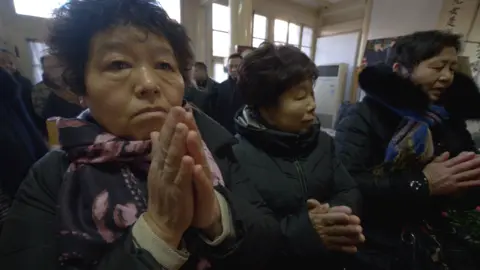
"Let's talk in the room," Er'jun adds, pointing to a tall building next to the courtyard. "There are face-recognition cameras set up over there, visitors' faces and identities will be recorded. You got in this time, the next time it may be harder."
A trickle of people make their way into Zhao's study, where his photograph, documents and possessions are displayed, alongside photographs of his late wife. It speaks of a loving family, proud of his achievements - Chinese premier, general secretary of the Chinese Communist Party and, before his purge, credited with driving crucial economic reform in China.
It's already stuffed with flowers and burning incense. More flowers are being placed outside the door.
Most visitors tell us that they are "from his home town". It might not be true in all cases, but it seems that you're more likely to get past the guards by saying it. And they are here to keep not just his memory, but his principles alive.
Zhang Baolin, a former journalist, covered the years when Zhao brought wealth to much of China - but also drew criticism for corruption - and then defied his party by defending the student protests in Tiananmen.
He says: "Zhao Ziyang played such a significant role in opening up and reform. Huge progress was made within his time. So I think, to an old man like Zhao who has passed away so many years ago, we should pay our respects. [If his name] is missing in the commemoration of opening-up and reform, we think it's very unfair."
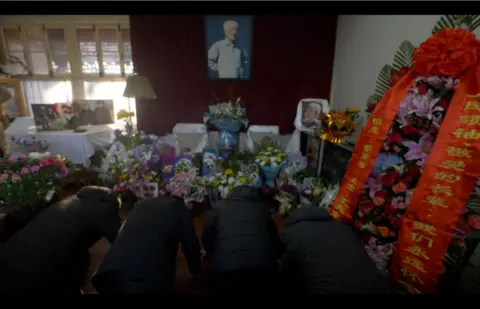
Zhao's name is not only missing in Chinese commemorations, but - like nearly everything connected with the events in Tiananmen - from Chinese history books and virtually all official publications since 1989, when he was ousted from the Party. But those in the courtyard hope that won't always be the case.
One visitor says: "I believe one day Zhao's reputation will be rehabilitated, because history won't be distorted for long. One day people will find out the truth. Yes, it's not included in history textbooks. But in my home we talk about it all the time - I don't want the next generation to forget."
Zhao's daughter Wang Yannan sighs, only cautiously optimistic that one day she might see the political rehabilitation of her father's legacy.
"Yes, confidence is here. So is the hope. But reality is another thing."
Zhao went to Tiananmen Square in 1989, knowing that Party hardliners were gaining the upper hand, and implored the students to leave; to save themselves and their future lives; to negotiate with the Party.
"We are already old, we do not matter any more," he told them.
But nearly 30 years later, remembering Zhao - and his principles - matters more than ever to some.
